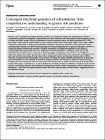| dc.contributor.author | CORVIN, AIDEN | |
| dc.date.accessioned | 2019-10-24T08:37:13Z | |
| dc.date.available | 2019-10-24T08:37:13Z | |
| dc.date.issued | 2012 | |
| dc.date.submitted | 2012 | en |
| dc.identifier.citation | Ayalew, M., Le-Niculescu, H., Levey, D.F., Jain, N., Changala, B., Patel, S.D., Winiger, E., Breier, A., Shekhar, A., Amdur, R., Koller, D, Nurnberger, J.I., Corvin, A., Geyer, M., Tsuang, M.T., Salomon, D., Schork, N.J., Fanous, A.H., O'Donovan, M.C., Niculescu, A.B., Convergent functional genomics of schizophrenia: from comprehensive understanding to genetic risk prediction., Molecular psychiatry, 2012, 17, 887-905 | en |
| dc.identifier.other | Y | |
| dc.identifier.uri | https://www.nature.com/articles/mp201237 | |
| dc.identifier.uri | http://hdl.handle.net/2262/89877 | |
| dc.description | PUBLISHED | en |
| dc.description.abstract | We have used a translational convergent functional genomics (CFG) approach to identify and prioritize genes involved in
schizophrenia, by gene-level integration of genome-wide association study data with other genetic and gene expression studies in humans and animal models. Using this polyevidence scoring and pathway analyses, we identify top genes (DISC1, TCF4, MBP, MOBP, NCAM1, NRCAM, NDUFV2, RAB18, as well as ADCYAP1, BDNF, CNR1, COMT, DRD2, DTNBP1, GAD1, GRIA1, GRIN2B, HTR2A, NRG1, RELN, SNAP-25, TNIK), brain development, myelination, cell adhesion, glutamate receptor signaling, G-protein--coupled receptor signaling and cAMP-mediated signaling as key to pathophysiology and as targets for therapeutic intervention.
Overall, the data are consistent with a model of disrupted connectivity in schizophrenia, resulting from the effects of
neurodevelopmental environmental stress on a background of genetic vulnerability. In addition, we show how the top
candidate genes identified by CFG can be used to generate a genetic risk prediction score (GRPS) to aid schizophrenia
diagnostics, with predictive ability in independent cohorts. The GRPS also differentiates classic age of onset schizophrenia from
early onset and late-onset disease. We also show, in three independent cohorts, two European American and one African
American, increasing overlap, reproducibility and consistency of findings from single-nucleotide polymorphisms to genes, then genes prioritized by CFG, and ultimately at the level of biological pathways and mechanisms. Finally, we compared our top candidate genes for schizophrenia from this analysis with top candidate genes for bipolar disorder and anxiety disorders from previous CFG analyses conducted by us, as well as findings from the fields of autism and Alzheimer. Overall, our work maps the genomic and biological landscape for schizophrenia, providing leads towards a better understanding of illness, diagnostics and therapeutics. It also reveals the significant genetic overlap with other major psychiatric disorder domains, suggesting the need for improved nosology. | en |
| dc.description.sponsorship | This work is, in essence, a field-wide collaboration. We would like to acknowledge our
debt of gratitude for the efforts and results of the many other groups, cited in our
paper, who have conducted and published empirical studies (human and animal
model, genetic and gene expression) in schizophrenia. With their arduous and careful
work, a convergent approach such as ours is possible. We would particularly like to
thank the ISC and GAIN consortia. We would also like to thank the subjects who
participated in these studies, their families and their caregivers. Without their
contribution, such work to advance the understanding of mental illness would not be
possible. Finally, we would like to acknowledge Elyn Saks for her insightful memoir,
which inspired the Yeats quote at the beginning of the paper. This work was
supported by an NIH Directors? New Innovator Award (1DP2OD007363) and a VA
Merit Award (1I01CX000139-01) to ABN. | en |
| dc.format.extent | 887-905 | en |
| dc.language.iso | en | en |
| dc.relation.ispartofseries | Molecular psychiatry; | |
| dc.relation.ispartofseries | 17; | |
| dc.relation.ispartofseries | 9; | |
| dc.rights | Y | en |
| dc.subject | Biomarkers | en |
| dc.subject | Convergent functional genomics | en |
| dc.subject | Genetic risk prediction | en |
| dc.subject | Pathways | en |
| dc.subject | Schizophrenia | en |
| dc.title | Convergent functional genomics of schizophrenia: from comprehensive understanding to genetic risk prediction | en |
| dc.type | Journal Article | en |
| dc.contributor.sponsor | Marie Curie | en |
| dc.contributor.sponsor | Science Foundation Ireland (SFI) | en |
| dc.type.supercollection | scholarly_publications | en |
| dc.type.supercollection | refereed_publications | en |
| dc.identifier.peoplefinderurl | http://people.tcd.ie/acorvin | |
| dc.identifier.rssinternalid | 83807 | |
| dc.identifier.doi | http://dx.doi.org/10.1038/mp.2012.37 | |
| dc.contributor.sponsorGrantNumber | IRG248284 | en |
| dc.contributor.sponsorGrantNumber | 08/IN.1/B1916 | en |
| dc.subject.TCDTheme | Genes & Society | en |
| dc.subject.TCDTheme | Neuroscience | en |




